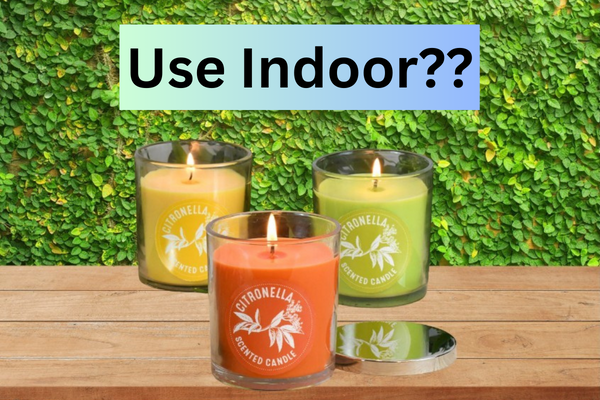Can You Use Citronella Candles Indoor? Let’s Explore in 2024.

If you’re familiar with outdoor gatherings during warm summer nights, chances are you’ve encountered citronella candles. These candles, infused with citronella oil, are renowned for their ability to repel mosquitoes and create a pleasant outdoor atmosphere. But what if someone wants to use citronella candles indoor? Let’s explore the possibilities and considerations of bringing this natural repellent inside your home.
What Is Citronella?
Citronella is a tall grass-like plant, generally found in tropical regions such as Africa, Asia and more. Citronella plant is famous for its oil, which is extracted from the plant’s leaves and stem through a distillation process. Citronella oil is known for its specific fragrance, which gives it a mosquito repellent property. Several products are made using the oil and the most common product is Citronella Candles.

Can we use Citronella Candles Indoor?
There is no doubt that Citronella candles are very effective in repelling bugs. However, in the majority, these candles are used outdoors such as garden or backyard. Recently, people have started using it indoor also. There are certain benefits as well as risks associated when someone use Citronella Candles indoor. Let’s undertsand:

Possible Benefits when we use Citronella Candles Indoors:
Some of the major benefits when we use Citronella Candles Indoor are as below:
Repelling Mosquitoes: One of the primary benefits of using citronella candles indoors is its ability to repel mosquitoes. The oil contains compounds that interfere with the mosquitoes’ ability to locate their prey, making it an effective deterrent against these pesky insects.
Creating a Refreshing Ambiance: Beyond its insect-repelling properties, citronella oil emits a fresh, citrusy aroma that can enhance the ambiance of indoor spaces. Its uplifting scent can help create a welcoming atmosphere, particularly during warm weather when windows and doors are open.
Potential Health Benefits: In addition to its insect-repelling qualities, some people believe that citronella oil may offer various health benefits. These purported benefits include mood enhancement, stress reduction, and even relief from minor respiratory discomfort.
Possible Challenges when we use Citronella Candles Indoors
Some of the challenges when we use Citronella Candles indoors are as below:
Potential Allergic Reactions: While citronella oil is generally considered safe for topical use and inhalation, some individuals may experience allergic reactions or skin sensitivities. It’s essential to perform a patch test before using citronella oil extensively indoors, especially if you have sensitive skin or respiratory issues.
Strong Scent: The strong, citrusy scent of citronella oil may not be appealing to everyone. Some individuals find the aroma overpowering, particularly when used in confined indoor spaces. Consider personal preferences and sensitivities when using citronella oil indoors.
Flammability Concerns: Citronella oil is highly flammable, making it essential to exercise caution when using it indoors. Keep candles and diffusers away from flammable materials, and never leave them unattended. Always follow the manufacturer’s instructions for safe usage.
Alternatives to Citronella Products
While citronella oil is a popular choice for repelling mosquitoes indoors, several alternatives offer similar benefits:
Essential Oils: Essential oils such as lavender, peppermint, and eucalyptus also possess insect-repelling properties. They can be used individually or blended to create custom mosquito repellents for indoor use.
Electronic Mosquito Repellents: Electronic mosquito repellents emit ultrasonic frequencies or use other mechanisms to deter mosquitoes without the need for open flames or fragrant oils. They’re an excellent option for those who prefer a low-maintenance solution.
Natural Mosquito Repellent Plants: Plants like basil, mint, and rosemary contain natural compounds that repel mosquitoes. Incorporating these plants into your indoor garden not only adds greenery to your space but also helps keep mosquitoes at bay.
Precautions required to use Citronella Candles Indoors
When someone use citronella candles indoors, it’s essential to take safety precautions to minimize risks:
- Proper Placement: Position citronella candles away from curtains, furniture, and other flammable objects.
- Ventilation: Ensure adequate ventilation to prevent the buildup of citronella fumes indoors. Open windows or use fans to circulate air while burning candles.
- Effectiveness: While citronella candles can help repel mosquitoes indoors, their effectiveness may vary depending on factors such as room size and airflow. Experiment with placement and quantity to achieve the desired results.
Conclusion
In conclusion, using citronella candles indoors can be a viable option for repelling mosquitoes and creating a refreshing ambiance. While citronella products offer several benefits, it’s essential to be mindful of potential challenges such as allergic reactions and flammability concerns. Consider exploring alternative mosquito repellent solutions to find the best fit for your indoor environment.
Frequently Asked Questions:
Yes, citronella candles can be used indoors safely when proper precautions are taken. Ensure adequate ventilation, keep candles away from flammable materials, and follow manufacturer instructions.
Citronella candles release a scent that masks the odors that attract mosquitoes, making it difficult for them to locate their prey.
Some people believe that citronella oil may offer health benefits such as mood enhancement and stress reduction, but scientific evidence is limited.
Potential risks of using citronella products indoors include allergic reactions, strong scent, and flammability concerns.
Alternatives to citronella include other essential oils like lavender and peppermint, as well as electronic mosquito repellents and mosquito-repelling plants.
